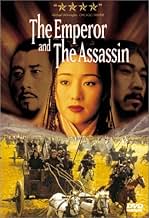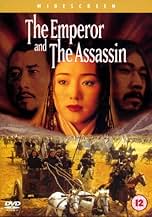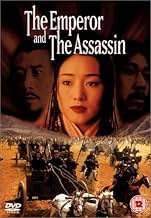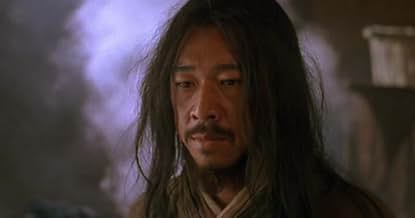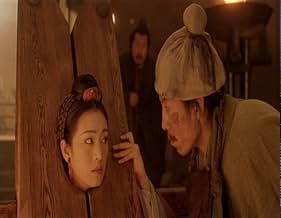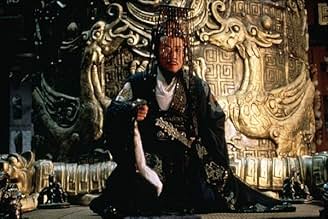AVALIAÇÃO DA IMDb
7,2/10
6,6 mil
SUA AVALIAÇÃO
Adicionar um enredo no seu idiomaIn pre-unified China, the King of Qin sends his concubine to a rival kingdom to produce an assassin for a political plot, but as the king's cruelty mounts she finds her loyalty faltering.In pre-unified China, the King of Qin sends his concubine to a rival kingdom to produce an assassin for a political plot, but as the king's cruelty mounts she finds her loyalty faltering.In pre-unified China, the King of Qin sends his concubine to a rival kingdom to produce an assassin for a political plot, but as the king's cruelty mounts she finds her loyalty faltering.
- Direção
- Roteiristas
- Artistas
- Prêmios
- 7 vitórias e 11 indicações no total
- Direção
- Roteiristas
- Elenco e equipe completos
- Produção, bilheteria e muito mais no IMDbPro
Avaliações em destaque
Based on the actual event , this epic, is set in the year 221 B.C and tells the true story of the unification of China. Action packed and filled with intrigue, passion, betrayals and unforgettable battle sequences, it held my attention throughout in spite of its 160 minute length.
The king, Ying Zeng, played by Li Xuejian is obsessed with unifying the seven kingdoms of China and becoming its first Emperor. His lover, Lady Zhao, played by the beautiful actress Gong Li, devises a plot whereby she will travel to the neighboring kingdom of Yan to set a fake assassination plot in motion which will give the king an excuse to invade Yan. However, she falls in love with the assassin as the king becomes more and more ruthless.
There are subplots, and tragedy and constant high drama. There are scenes of great beauty and of abject cruelty. There is great cinematography and brilliant use of physical space.
The deep characterization made me think of Shakespeare. And tragic events that call to mind Greek drama. And yet it is totally Chinese as it deals with age-old questions of whether the ends justify the means. And raises the questions dealing with life and death and good and evil and all the blurred edges in between.
It is the story of individuals against the backdrop of history, a history that has shaped China for the past two thousand years. I was swept up in the story as well as the moral questions raised. There are no easy answers and this was one of the strengths of the movie.
Recommended. But be prepared for the violence and gore.
The king, Ying Zeng, played by Li Xuejian is obsessed with unifying the seven kingdoms of China and becoming its first Emperor. His lover, Lady Zhao, played by the beautiful actress Gong Li, devises a plot whereby she will travel to the neighboring kingdom of Yan to set a fake assassination plot in motion which will give the king an excuse to invade Yan. However, she falls in love with the assassin as the king becomes more and more ruthless.
There are subplots, and tragedy and constant high drama. There are scenes of great beauty and of abject cruelty. There is great cinematography and brilliant use of physical space.
The deep characterization made me think of Shakespeare. And tragic events that call to mind Greek drama. And yet it is totally Chinese as it deals with age-old questions of whether the ends justify the means. And raises the questions dealing with life and death and good and evil and all the blurred edges in between.
It is the story of individuals against the backdrop of history, a history that has shaped China for the past two thousand years. I was swept up in the story as well as the moral questions raised. There are no easy answers and this was one of the strengths of the movie.
Recommended. But be prepared for the violence and gore.
Chen Kiage (Farewell My Concubine) and Zhang Yimou (Red Sorghum, To Live) have been always considered two of the greatest director of modern China cinema history. This time Chen took three years after his previous film and came back with a movie about the first Chinese emperor Qin and his legendary story with a woman he loves, his adversary and an assassin in very ancient China of 221 BC. Assassin Jingke stab emperor Qin is a well know story that nearly every Chinese know it so well. Assassin Jingke was considered a biggest hero in the history for his great sacrifice spirit and the brave suicide assassination, although his action was failed. Zhang Fengyi is one of my favorite actor (I like his performance in Farewell my concubine), his assassin Jinke is silent and full of passion in the heart, that is convincing. Li Xuejian is honorable actor but just miscast here, His King Qin is always with tears in his eyes and feels miserable. I can not understand why Chen decides to make this most tyranny emperor in the Chinese history always crying. The most attractive role in the movie is Marquis Changxin, he married Qin's mother and most time he looks like idiot but actually he has his own ambitious plan. Marquis Changxin is convincingly played by Wang Zhiwen, I like him so much.
The movie do have some memorable moments, one is Jingke took a assignment to kill the whole family of ironsmith, but when he facing the angelic blind daughter of ironsmith, he cannot do his job. Late, the daughter killed herself. That event had a biggest influence for the rest of Jingke's life, also a big impact for the audience.
The movie has some most popular Chinese comedian (Pan Changjiang for prison officer and Zhao Benshan for Gao Jianli) for the friendly cameo, when they appears in the screen, audience shout and smiled. This would not happened when this movie is showed in country outside China.
I don't know if it is the biggest budget film in China, but it is surely one of them. They built Qin's palace especially for this movie and now becomes a tourist sight. It is near my city. I didn't go there but my father did. He said it is great building.
Overall, this is the excellent movie for the people like ancient Chinese costume and culture. The photography is very beautiful. Compared to the greatest "Farewell My Concubine", Chen does not make it reach that level. I give it *** for the rate from * to ****.
The movie do have some memorable moments, one is Jingke took a assignment to kill the whole family of ironsmith, but when he facing the angelic blind daughter of ironsmith, he cannot do his job. Late, the daughter killed herself. That event had a biggest influence for the rest of Jingke's life, also a big impact for the audience.
The movie has some most popular Chinese comedian (Pan Changjiang for prison officer and Zhao Benshan for Gao Jianli) for the friendly cameo, when they appears in the screen, audience shout and smiled. This would not happened when this movie is showed in country outside China.
I don't know if it is the biggest budget film in China, but it is surely one of them. They built Qin's palace especially for this movie and now becomes a tourist sight. It is near my city. I didn't go there but my father did. He said it is great building.
Overall, this is the excellent movie for the people like ancient Chinese costume and culture. The photography is very beautiful. Compared to the greatest "Farewell My Concubine", Chen does not make it reach that level. I give it *** for the rate from * to ****.
10oaksong
I've read some grumbles about the court scenes. These people betray their ignorance. This production went to simply amazing lengths to recreate all aspects of the period in which the story occurred. Courtly manners are something few people outside the court ever see. While the acting may appear highly stylized, it is, in fact, as close a replication as possible of the behavior of individuals in their particular stations as the director could create. The actor's facial expressions are a marvel, particularly the duplicitous Marquis Changxin and the King's mother.
There are, of course, reflections of both Greek and Shakespearian tragedy in the relationship between the king, his parents and his love. The juxtaposition of the king transforming from good to bad and the assassin from bad to good provides much food for thought on the evolution of an individual's nature. This movie would provide much to ponder in a college course on the humanities.
At the same time, it almost rushes along, even in the slowest scenes heading towards an inexorable denouement. One suspects the involvement of large portions of the troop movements, which were quite awesome. It makes The Lord of the Rings battle scenes pale by comparison. Few directors have the ability to literally field thousands of humans on the field of battle just for art's sake. I recall one scene in which at least 30,000 troops can be seen moving across a huge plain. The logistics for such a shot would have been staggering.
I could go on... but simply, I can't recommend this film highly enough.
There are, of course, reflections of both Greek and Shakespearian tragedy in the relationship between the king, his parents and his love. The juxtaposition of the king transforming from good to bad and the assassin from bad to good provides much food for thought on the evolution of an individual's nature. This movie would provide much to ponder in a college course on the humanities.
At the same time, it almost rushes along, even in the slowest scenes heading towards an inexorable denouement. One suspects the involvement of large portions of the troop movements, which were quite awesome. It makes The Lord of the Rings battle scenes pale by comparison. Few directors have the ability to literally field thousands of humans on the field of battle just for art's sake. I recall one scene in which at least 30,000 troops can be seen moving across a huge plain. The logistics for such a shot would have been staggering.
I could go on... but simply, I can't recommend this film highly enough.
After seeing dressed up action films, like the two mentioned above, Emperor and the Assassin was a godsend. This film was such a marvelous blend of action, intrigue, and personality, and I'm sure I'll see it again and again in years to come.
Some of the complaints about the movie have been the golden/brown tint and the quick, disorienting editing. However, I loved both of these qualities in the movie, though the editing did take some time to get used to. A great example of it, is when we're introduced to Jing Ke, the assassin. He is offered an assignment for five thousand, and we see a close up of his face as he demands ten thousand. The next shot shows him with sword drawn, in the house of his victims. That whole introduction to the assassin was marvelously edited, in my opinion. You have to realize that in order to fit the epic plot into just under three hours, a lot of tiny details needed to be cut out. The quick editing also makes the movie seem much shorter than it really is.
Someone said that the swordfighting in the movie (what little of it there was) seemed like high school drama, but I strongly disagree. Most of the action is captured in a few shots, making it seem much more realistic. In so many american films, we see a a flash of a dozen close ups, without getting a feel for what is even happening! Also, the constant use of slow motion in many movies gets so old. By having the fighting in this movie fast and furious, it is much more affecting.
I won't give away the ending, but it was really suspenseful and surprising. I had no idea what would happen (being unfamiliar with Chinese history helped), and was on the edge of my seat! So, to conclude, if you like sweeping historical epics, make sure to see this! I really like the films of Kurosawa, and saw some similarities here, so also if you like his movies, see this!!
Some of the complaints about the movie have been the golden/brown tint and the quick, disorienting editing. However, I loved both of these qualities in the movie, though the editing did take some time to get used to. A great example of it, is when we're introduced to Jing Ke, the assassin. He is offered an assignment for five thousand, and we see a close up of his face as he demands ten thousand. The next shot shows him with sword drawn, in the house of his victims. That whole introduction to the assassin was marvelously edited, in my opinion. You have to realize that in order to fit the epic plot into just under three hours, a lot of tiny details needed to be cut out. The quick editing also makes the movie seem much shorter than it really is.
Someone said that the swordfighting in the movie (what little of it there was) seemed like high school drama, but I strongly disagree. Most of the action is captured in a few shots, making it seem much more realistic. In so many american films, we see a a flash of a dozen close ups, without getting a feel for what is even happening! Also, the constant use of slow motion in many movies gets so old. By having the fighting in this movie fast and furious, it is much more affecting.
I won't give away the ending, but it was really suspenseful and surprising. I had no idea what would happen (being unfamiliar with Chinese history helped), and was on the edge of my seat! So, to conclude, if you like sweeping historical epics, make sure to see this! I really like the films of Kurosawa, and saw some similarities here, so also if you like his movies, see this!!
This three-hour Chinese epic, set in 220 B.C., may ultimately amount to a familiar theme of an Emperor's idealistic dream of peace through unification mutating into corrupted isolation, and there's nothing inherently challenging about the film, but it's a compelling narrative, crammed with intrigue and passion and betrayal and epic events told in vivid strokes. Even for those not drawn to such historical spectacles for their own sake, it's an astonishing feast for the eyes: the scene depicting the coup attempt of the Marquis is one of the most staggering evocations of physical space and grandeur in memory, and the battle scenes are memorable both in their scope and their immediacy. The title sums up the film's use of compelling contrasts - huge plainland vistas set against intimate horrors; the noblest of motives set against the most degraded; hope turning to dust. If you've never seen a three-hour Chinese epic, this wouldn't be a bad place to start.
Você sabia?
- CuriosidadesThe Xianyang palace was reconstructed in its entirety in the city of Dongyang in Zhenjiang province. Much of the film, including the final scene, was shot there. It is now being preserved as a theme park drawing large numbers of tourists. In addition, the capital cities of the other kingdoms featured in the film, Yan Zhao and Han, were constructed as several sights across China. All have been meticulously built to scale with special attention paid to their historical accuracy.
- Versões alternativasFirst cut was deemed regime-critic by chinese censors and therefore rejected. Approximately 30 minutes were cut to make a more regime-friendly version.
Principais escolhas
Faça login para avaliar e ver a lista de recomendações personalizadas
- How long is The Emperor and the Assassin?Fornecido pela Alexa
Detalhes
- Data de lançamento
- Países de origem
- Centrais de atendimento oficiais
- Idioma
- Também conhecido como
- The Emperor and the Assassin
- Empresas de produção
- Consulte mais créditos da empresa na IMDbPro
Bilheteria
- Orçamento
- US$ 15.000.000 (estimativa)
- Faturamento bruto nos EUA e Canadá
- US$ 1.267.239
- Fim de semana de estreia nos EUA e Canadá
- US$ 47.295
- 19 de dez. de 1999
- Faturamento bruto mundial
- US$ 1.267.239
- Tempo de duração
- 2 h 42 min(162 min)
- Cor
- Mixagem de som
- Proporção
- 1.85 : 1
Contribua para esta página
Sugerir uma alteração ou adicionar conteúdo ausente


